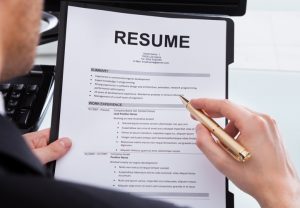
Imagine being surrounded by potential employers and industry professionals at a networking event. In your hand, you have your one-page resume, your career story condensed and curated to perfection. As you hand it to someone, you see them scan it, nodding in appreciation, and you feel a thrill of satisfaction. That’s the power of a one-page resume. It’s your career at a glance, a concise and compelling snapshot of who you are and what you bring to the table. Hiring managers don’t have time to sift through pages of information. They want to know, at a glance, if you’re the right person for the job. A one-page resume can make all the difference in getting noticed and landing an interview.
This guide will equip you with the knowledge and skills on how to use AI to create a resume that showcases your unique strengths and achievements. Resumonk’s AI Resume Builder can make this task a lot easier.
Does a CV Need to Be One Page?

Should your resume be one page or two? In most cases, one page is the way to go. If you have less than 10 years of relevant experience, you can fit everything you need to convey onto a single page. A two-page resume might be necessary if you have a decade or more of experience and many accomplishments to highlight. It’s all about making the most of your space and ensuring that every word counts.
Resume Length: How Many Pages You Need
The length of your resume will depend on your work experience and the industry in which you work. To figure out the best approach for you, review the list below of resume lengths for some common scenarios.
One-Page Resumes
The most common length for resumes is one full page. This length is especially well-suited for anyone with one to ten years of relevant work experience, including current or recent college graduates.
Career switchers might consider using a single-page resume instead of a two-page one, even if they have over a decade of work experience if some of their previous experience is irrelevant to the job. One-page resumes remain a standard length that will fit many use cases, particularly early-career professionals.
Two-Page Resumes
In the past, most resumes were expected to be only one page. Some professionals argue that two-page resumes are preferable because they allow job seekers to include more keywords that automated systems might recognize in their resumes. When in doubt, err on the more focused and shorter resume.
Benefits of Using a Two-Page Resume for Mid-Career Professionals
Two-page resumes are becoming increasingly common, particularly as electronic resumes replace paper ones. Hiring managers can easily scroll through resumes digitally rather than thumbing through a physical stack on their desks, making a two-page resume a less daunting prospect.
Two-page resumes are good for those with enough experience to fill both pages. Two-page resumes are best suited to mid-career professionals with 10-15 years of relevant experience applying to leadership positions within an organization.
Three-Page (Or More) Resumes
You should only submit a three-page resume if you meet a specific set of criteria or the industry in which you work specifically asks for resumes of this length.
Three-page resumes or longer are reserved for researchers, who often have lengthy resumes or CVs due to long lists of citations for published work. Mid-to-late-stage professionals with 15+ years of experience who are applying to senior-level positions may also find that a three-page resume is required to highlight their work experience and accomplishments adequately.
What are The Benefits of a One Page CV?

The Power of Simplicity: Crafting Your One-Page Resume
You’ve got a hiring manager with a stack of resumes in front of them. They’re scanning each one, searching for the perfect candidate. Imagine your resume lean, mean, and right to the point. That’s the beauty of a one-page resume. In a world where attention spans are shrinking, this format ensures that every word on your resume counts.
It’s about getting straight to the point and showcasing your top skills and experiences without fluff. By keeping it concise, you’re helping the hiring manager quickly grasp what you bring. It’s like a handshake brief, firm and meaningful, leaving no room for confusion or filler.
Create Lasting Impressions with Your One-Page Resume
Let’s talk about being memorable. A one-page resume is your secret weapon when you want to leave a lasting impression on hiring managers. When they reflect on all the resumes they’ve received, yours stands out because it’s focused and impactful. It’s easy to remember.
This can work wonders in ensuring you’re not just another applicant but a candidate they’re genuinely interested in. A well-organized, concise resume has the power to stay in their minds, increasing the likelihood of you getting that interview call. It’s about making hiring managers remember you and want to interview you.
How a One-Page Resume Shows Your Prioritization Skills
Creating a one-page resume isn’t just about saving space; it’s a skill that demonstrates your ability to prioritize. When you’re limited to one page, carefully select which experiences and achievements to include. This means you must prioritize what’s most relevant to the job you’re applying for.
You’re showcasing your experiences and proving that you can focus on what truly matters. It’s a skill that employers value in any professional setting. It’s about showing you know how to set priorities and focus on the most important.
Efficiency Speaks Volumes: The ‘Less is More’ Approach in Competitive Fields
Competitive industries are like fast-moving trains. If you want to hop on, you’ve got to be quick and efficient. A one-page resume helps you communicate your value without any extra baggage. It’s about confidently presenting your most valuable skills and experiences.
You project an image of efficiency, which is greatly appreciated in fast-paced environments. It’s about showing that you can keep up with the industry’s demands and have the confidence to highlight your expertise. In competitive fields, efficiency is key; your one-page resume helps you convey just that.
One-Page Resumes: Making it Easy for Employers to Navigate
Hiring managers don’t have time to read long resumes. They seek specific information, like:
- your latest job title
- Skills
- Education
A one-page resume makes it incredibly easy to find what they need. Everything’s right there, on one page.
There is no need to flip through multiple sheets. This ease of navigation makes your resume more user-friendly, which hiring managers appreciate. It’s about making their job easier and ensuring they don’t miss any crucial details about your qualifications.
Writing with Impact: How a One-Page Resume Encourages Strong Writing
Crafting a one-page resume requires concise, impactful language. Since you have limited space, you must communicate your value effectively. This means writing every accomplishment and experience clearly and compellingly.
Employers highly value the ability to write concisely, especially in positions that require effective communication.
Leave Them Wanting More: The Art of Intrigue with a One-Page Resume
A one-page resume captures the most critical aspects of your professional journey without revealing everything. It’s like a teaser of your qualifications. If you’ve piqued the hiring manager’s interest, they will likely have follow-up questions during an interview.
This allows you to expand on your achievements and experiences, adding depth to your candidacy. It’s about creating a sense of intrigue and leaving them wanting to know more about you.
Elevate Your Resume with Resumonk
Ready to create a resume that truly stands out? Resumonk’s professional resume templates are here to help. With smart AI rewriting and suggestions, plus 20 premium templates, you can easily craft an impressive resume.
How to Write a One-Page Resume

Zero in on Key Accomplishments
Imagine you’re trying to impress someone at a party. You wouldn’t just list everything you’ve ever done, right? You’d focus on the stories that show who you are. Your resume is no different. You might have a lot of achievements, but you only have limited space to show your best to your potential employer.
Focus on each role’s two or three most impressive accomplishments. Make sure they’re directly relevant to the job you’re applying for, and cut anything redundant. This will keep your one-page resume clean, concise, and impactful.
Tailor Your Resume to the Position
Applying for multiple jobs with the same resume can feel productive but counterproductive. Each time you send your resume, it should be tailored to fit the:
- Skills
- Experiences
- Requirement
Be Selective with Content
To create a one-page resume, you must be brutally selective with your content. Carefully review your:
- Background
- Skills
- Accomplishments
Choose the most relevant experiences for the job you’re applying to. Your content should be tailored to the job description and only address what the hiring manager or recruiter seeks. Even if it feels hard, eliminate irrelevant or outdated information to create space for more essential details.
Prioritize the Most Relevant Information
It’s also important to prioritize details within each section. For example, in the “Work Experience” section, only focus on accomplishments, projects, and responsibilities that demonstrate the skills and experiences most relevant to the job you’re applying for.
If you find yourself short on space in the “Education” section, focus on your highest level of education.
Cut Unnecessary Sections
Including volunteer work or interests on your resume can be helpful when you have limited work experience; they should be the first thing to go if you need to free up space for your work experience. You shouldn’t include references on your resume. Most employers don’t require references; others will ask to see your references later in the hiring process.
How to Easily Make a One-Page CV Without Reducing its Content
There are several ways to shorten your resume length on Resumonk apart from reducing the content.
- You can choose a template that is optimized for space such as:
- You can change the page size for your resume PDF.
- You can use the smallest spacing setting for your resume PDF.
- You can try reducing the PDF page margins.
All these options are available on the ‘Preview & Download’ tab.
What Not to Include on a One-Page Resume

Objective Statements: Say Goodbye
Let’s address the elephant in the room: objective statements. They’re outdated. Instead of cluttering your resume with a generic objective, switch to a concise summary that highlights your skills and aligns with the job you’re after. This approach packs a punch and catches the eye faster.
Outdated Skills: Don’t Be Stuck in the Past
Nobody needs to know you can use Microsoft Word or browse the internet. Those are baseline skills we all possess. Trade them out for relevant technical skills or niche software expertise. Tailor your skills to match the job description, making your resume stand out.
Long Descriptions for Minor Roles: Keep It Short and Sweet
If you’ve held positions unrelated to your target job, don’t waste valuable space detailing them. Opt for summaries or omit them altogether. This focused approach leaves room to highlight experiences that matter.
Full Mailing Address: Skip the Snail Mail
Gone are the days when your complete mailing address was included on your resume. For privacy and efficiency, stick to just your city and state. This change reflects modern resume standards and saves space.
Excessive Formatting or Graphics: Keep It Clean
A clean, professional format beats unique graphics, colors, or elaborate fonts. Opt for a simple, easy-to-read design that lets your content shine through. This makes your resume more accessible and appealing to employers.
Salary Expectations: Don’t Be Premature
Your resume isn’t the place to discuss salary expectations. These conversations are better left for interviews, where you can gauge the employer’s interest. Including them on your resume can come off as presumptive and may even hurt your chances.
Jargon and Clichés: Skip the Buzzwords
Steer clear of overused phrases like “team player” or “hard worker.” These clichés don’t add value to your resume. Highlight your quantifiable achievements to demonstrate your abilities directly.
Get An Interview for Your Dream Job with Ease with Resumonk
Your resume needs to grab attention immediately in job applications. Resumonk is an AI-powered resume builder that streamlines this process. Imagine having a tool that helps you create stunning resumes and optimizes each entry with smart AI rewriting and suggestions. Resumonk offers 20 premium resume templates and matching cover letters, ensuring your application stands out visually and content-wise.
Resumonk simplifies the often tedious task of resume creation with features like:
- LinkedIn profile importing
- Existing resume uploads
- Multiple resume management
Whether you’re a detail-oriented job seeker, a student, or a seasoned professional, our intuitive platform transforms resume building into an intelligent and seamless experience.



